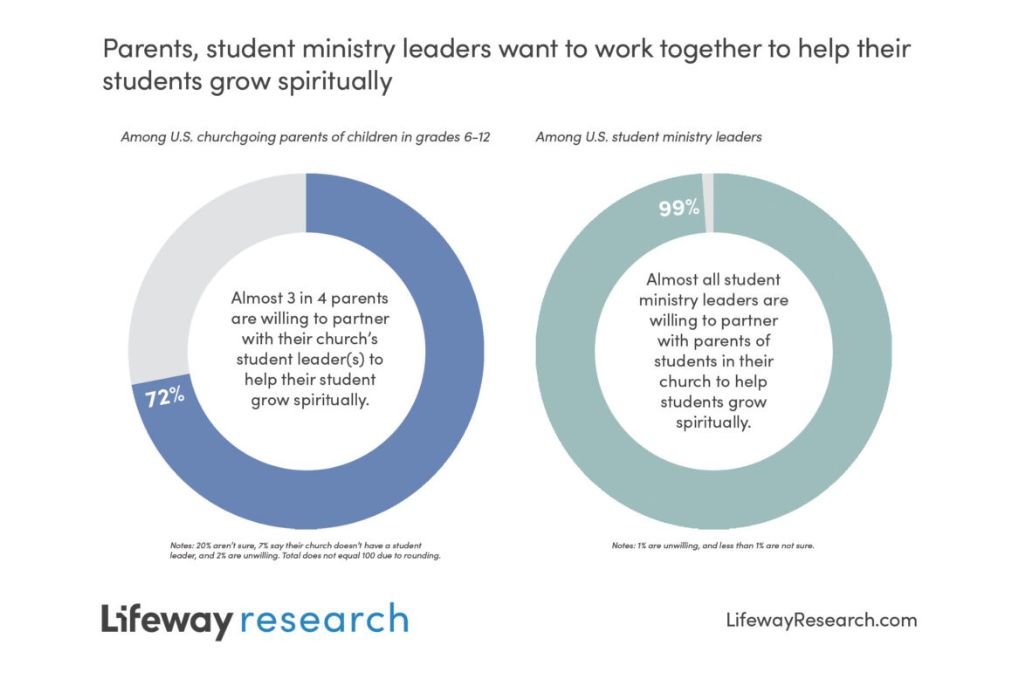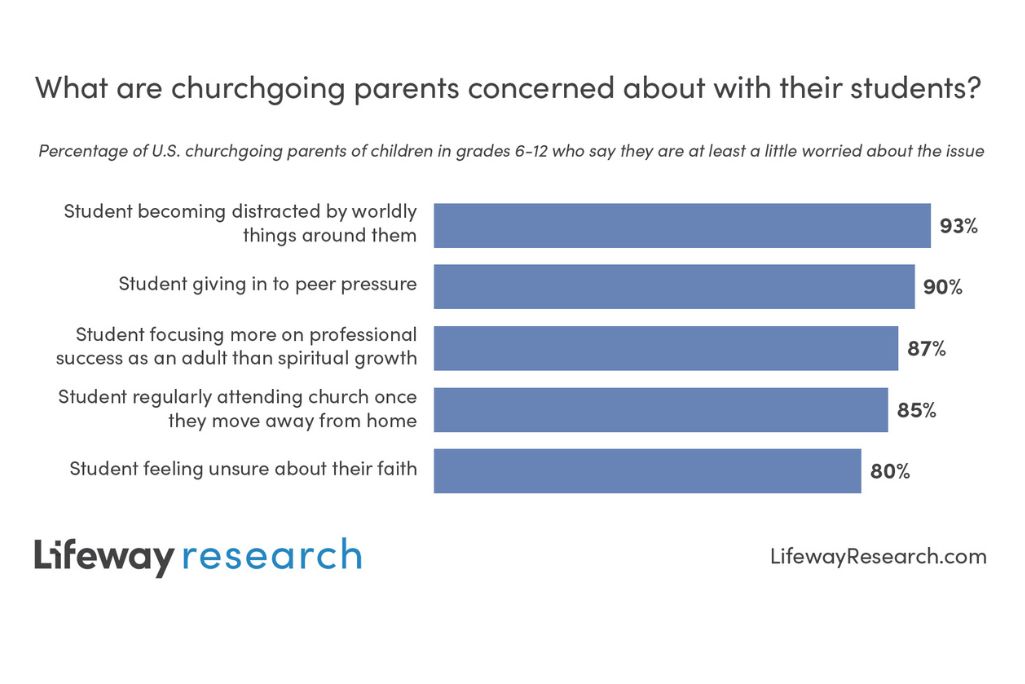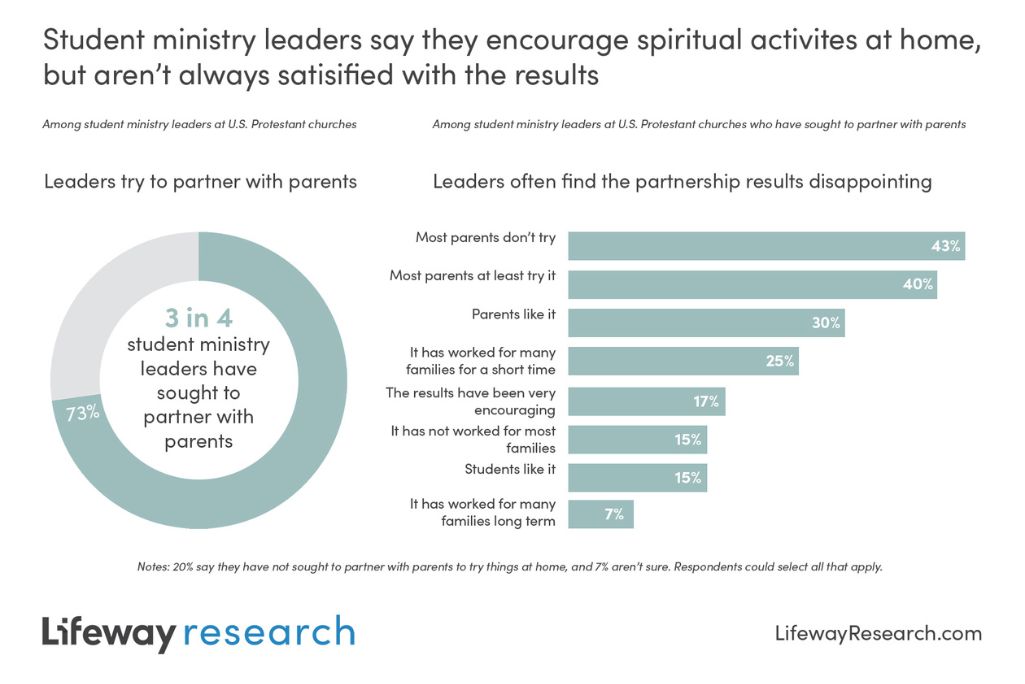
BRENTWOOD, Tenn. — Anecdotes often portray parents and student ministry leaders at odds, but both groups share a desire to see the next generation grow spiritually. Each also believes they have a positive, healthy relationship with the other.
A study from Lifeway Students and Lifeway Research explores the perspective of churchgoing parents of teenagers and those who lead student ministries in local churches. Both emphasize the spiritual health of their students and say they want to work together to see the next generation become disciples of Christ.
“For believing parents, a key goal is that their teenagers develop a genuine faith in Christ — a desire shared by student ministry leaders,” said Chad Higgins, coauthor of “Define the Relationship: Growing a Parent Ministry that Brings Families and Churches Together,” a book based on this research. “Both want students to grow spiritually healthy and mature in their walk with Christ. To align on this, we need to move beyond tracking church attendance as the sole measure of faithfulness and help parents understand and discuss terms like ‘spiritually healthy’ or ‘growing in Christ’ in meaningful ways.”

Around 9 in 10 parents (89%) feel they have a great relationship with the leader of their church’s student ministry. For their part, only 16% of student ministry leaders say they feel tension with parents, while 79% disagree.
Almost 3 in 4 parents (72%) say they are willing to partner with their church’s student leader to help their student grow spiritually. Among student ministry leaders, 99% are open to partnering with parents for students’ spiritual growth.
“This research shows that student leaders in churches and parents of teens want to work together to encourage their student to follow Christ,” said Scott McConnell, executive director of Lifeway Research. “While these good intentions haven’t always produced practical momentum in the home, defining the important elements should help student leaders develop a more effective strategy of support for parents.”
Parents’ perspective

Lifeway Research surveyed 1,001 parents who regularly attend church and have at least one child in grades 6-12. They shared hopes for their children, experiences with student ministry and if they felt they could use some help.
When asked their biggest priority for their student’s future, 2 in 5 (41%) say their main goal is spiritual well-being. Around half as many point to emotional well-being (19%) and physical well-being (18%). Fewer choose financial well-being (9%), having a profession they enjoy (9%) or relational well-being (4%).
Most parents place spiritual (71%), emotional (66%) and physical (60%) well-being of their student’s future as one of their top three priorities. Almost half (45%) say financial well-being, a third (32%) choose their student having a profession they enjoy, and a quarter (25%) say relational well-being is one of their top three highest priorities.
“All the potential priorities listed for parents are good things,” McConnell said. “This is the tension that exists in every Christian home. Parents are forced to consider if seeking the kingdom of God and encouraging their student to do the same is of first importance or one of many things they want.”
Seven in 10 churchgoing parents (71%) actively encourage their students to be engaged in the Christian faith, including 37% who strongly encourage them. Far fewer say they leave their spiritual development up to their student (12%), share information about different faiths without trying to influence their student (11%) or leave their student’s spiritual development up to their church (6%).
Most parents feel their encouragement has paid off. Seven in 10 (72%) say their student often or consistently lives out a belief in Jesus Christ, with 42% saying their student does so often and 30% saying they do so consistently. One in 5 (20%) say their student has shown interest in following Jesus. Far fewer say their student’s beliefs lean toward a faith other than Christianity (4%), their student has not shown interest in spiritual beliefs (2%), or they don’t know their student’s spiritual maturity (1%).
Still, parents have concerns about their students and their spiritual growth. More than 9 in 10 (93%) are at least a little worried their students will become distracted by worldly things. Nine in 10 (90%) have some concern about their students giving into peer pressure. Almost as many (87%) say they have some level of concern about their students focusing on professional growth while neglecting their spiritual growth. Four in 5 (80%) are at least a little concerned their students will feel unsure about their faith.
Additionally, 5 in 6 (85%) say they’re at least a little concerned about their student regularly attending church once they move out. These worries specifically are grounded in a statistical reality. A 2019 Lifeway Research study found two-thirds of those who attended church regularly for at least a year as a teenager say they also dropped out for at least a year as a young adult.
“Church leaders often notice students’ high commitment to sports and extracurriculars and can feel like they compete with church involvement,” said Higgins, co-host of the “Youth Ministry Booster” podcast. “Without real relationships with families, it’s nearly impossible to have priority conversations that don’t come across as accusatory or speculative. This lack of connection can fuel the perception of conflicting goals, even when the core desires of leaders and parents align.”
Most parents (62%) say they’re equipped to help their students develop spiritually, while 36% feel the opposite. Yet, 94% agree they want to become more equipped for this, and just 5% disagree.
This may be where parents would like help from student pastors. Only 2% say they’re not willing to partner with their church’s student leader to help their student grow spiritually, but 72% say they are open to that partnership. One in 5 (20%) aren’t sure, and 7% say their church doesn’t have a student ministry leader.
Student leaders’ standpoint

For their part, student ministry leaders want to partner and work with parents, but many have limited time and feel overwhelmed. Some leaders are full-time staff members, while others serve as volunteers. Lifeway Research surveyed 1,056 people who are either the primary leader of student ministry at their church or a leader who assists with student ministry at their church and is knowledgeable about it.
“Student ministers and other leaders are working hard to create a safe, nurturing environment where students can grow spiritually,” said Higgins. “They’re also seeking true partnership with families, moving beyond a one-size-fits-all discipleship model. Leaders want to communicate where students are and collaborate on the best ways to foster spiritual growth together.”
The average week for a student ministry leader includes a large portion of their time engaged in preparation work alone (11 hours) or with church staff (seven hours). Most other time is invested in the students themselves, including four hours at student ministry activities, two hours with students one-on-one and two hours with students at their extracurricular activities or hanging out. Much less time involves adult volunteers in the ministry (two hours) or parents (one hour).
Still, equipping parents is an area in which student ministry leaders want to improve. When asked what they’d love to see their ministry do more of next year, if they could do it well, leaders often pointed to increased involvement with parents. Around 7 in 10 say they’d want to increase their equipping of parents with tools to disciple their students (70%) and training of parents to disciple their students (67%).
Many also say that if they could do it well, they would love for parents and student leaders to grow in their relationships with each other (46%) and for parents to grow in their relationships with each other (41%). Almost as many leaders say they’d want to improve sharing information with parents to keep them aware of new elements of youth culture (38%).
Half of student ministry leaders (52%) say they would want to train Bible study leaders of students next year. Fewer point to a priority of offering big events to attract more students (33%). Another 23% would want to offer girls’ ministry activities.
As leaders see a need to do more training and equipping of parents, they also see parents who want to be engaged in the spiritual development of their students. Three in 4 (76%) say parents in their church are concerned about their student’s spiritual development. Additionally, 7 in 10 student ministry leaders (71%) say parents in their church are proactive in encouraging their students to engage in the Christian faith.
Despite all the desire to partner with parents and do more training, most student ministry leaders (57%) say they don’t have a clearly defined strategy for ministering to parents.
“Student ministers should recognize it’s tough for parents to replicate something they’ve never experienced,” said Higgins. “If parents grew up without a model of discipleship in the home, they’re learning from scratch. Understanding this can help ministers approach parents with empathy and support as they navigate their role.”
Student ministry leaders aren’t only concerned about what happens at church. Around 3 in 4 (73%) say they have sought to partner with parents to encourage spiritual activities at home, but some have been disappointed with the results.
More than 2 in 5 leaders who have tried to partner (43%) say parents don’t even try to engage at home in the spiritual activities they suggest, while 40% of leaders say the parents at least try it. Three in 10 (30%) say the parents like it, but half as many (15%) say the students enjoy it. A quarter believe the activities have worked for many families for a short time (25%), 7% say these activities worked for many families for a long time, and 15% don’t think they’ve worked for most families. Around 1 in 6 (17%) say the results have been very encouraging.
Ministry leaders point to several challenges that have limited the success of these efforts. Around 2 in 5 (42%) say parents don’t have time to prepare. Three in 10 (31%) believe the activities have been things parents did not want to do, while 27% say the students haven’t wanted to participate.
A quarter (24%) say church leaders don’t have time to plan and communicate the connection between the church’s efforts and parents’ efforts in students’ spiritual development.
One in 10 student ministry leaders say the parent-student activities expected too much time together (11%), or the format of the activities has not been enjoyable (11%). One in 20 (5%) say the topics haven’t been relevant.
Some leaders blame busyness (7%), while others say it’s apathy and the activities not being a priority (4%). A few say the parents’ efforts are not tied to the church’s efforts because the parents are non-Christian or unchurched (3%).
After examining this study, Higgins said he and co-author Zac Workun wrote “Define the Relationship” to equip church leaders to lead relationally in parent discipleship. “Holding two informational meetings a year won’t shift the tide of discipleship in the home, if that’s our goal,” he said. “We want to see leaders build ongoing, meaningful connections that empower families to grow together in faith.”
For more information, view the complete report for parents and the complete report for student leaders, and visit LifewayResearch.com.
Methodology
Parent study: The online survey of 1,001 student ministry parents was conducted Jan. 30 — Feb. 9, 2024, using a national pre-recruited panel. Respondents were screened to include those who identified as Protestant/non-denominational, attend religious services at least once in a typical month and have at least one child in grades 6-12.
Parents were advised that for this survey, a “student” includes any of their children in grades 6-12. If they have more than one child in their home who is a student, half of the parents were instructed to answer for their oldest student in grades 6-12, and half were instructed to answer for their youngest student in grades 6-12.
Quotas and slight weights were used to balance gender, age, region, ethnicity, education and religion to more accurately reflect the population. The completed sample is 1,001 surveys. The sample provides 95% confidence that the sampling error from the panel does not exceed plus or minus 3.2%. This margin of error accounts for the effect of weighting. Margins of error are higher in sub-groups.
Student ministry leader study: The online survey of 1,056 student ministry leaders was conducted Feb. 8-28, 2024. Contact lists of student ministry leaders were developed from both Lifeway’s lists and outside lists. Each respondent was screened to ensure they are able to describe the student ministry at their church and that their church is Protestant or non-denominational Christian in the U.S.
Student leaders are defined for this study as either someone who is the primary leader of student ministry at their church or a leader who assists with student ministry at their church and is knowledgeable about it. Southern Baptist student ministry leaders were oversampled. The 815 Southern Baptist Convention (SBC) responses were weighted down to reflect their correct proportion of Protestant churches.
Responses were weighted by region, church size and denominational category to more accurately reflect the population. The completed sample is 1,056 surveys. The sample provides 95% confidence that the sampling error does not exceed plus or minus 6.2%. This margin of error accounts for the effect of weighting. Margins of error are higher in sub-groups.
Limitations: Probability samples for Protestant student ministry leaders do not exist. When representative sampling is not possible, it is important to obtain as wide a variety of respondents as possible. Three broad sources were used:
- Ministers of students identified by congregations in SBCWorkspace (the database of Southern Baptist congregations)
- Two purchased lists of youth leaders
- Youth leaders who have interacted with Lifeway’s camps, events, Bible study resources and website
Note that some groups are less represented because the scope of this study does not include churches that do not have student ministry activities. Groups that interact with Lifeway less will be underrepresented in this study.
Indications of the breadth of the sample prior to weighting include:
- Sizes of churches participating (19% <100, 33% 100-249, 23% 250-499, 25% 500+)
- Gender of student ministry leaders (83% Male, 17% Female)
- Ethnicity of leader (90% White, 2% African American, 4% Hispanic, 5% Other)
- Ages of student ministry leaders (24% 18-29, 62% 30-49, 14% 50+)
- Region of churches participating (2% Northeast, 13% Midwest, 78% South, 8% West)
(EDITOR’S NOTE — Aaron Earls is a writer for LifeWay Christian Resources.)


